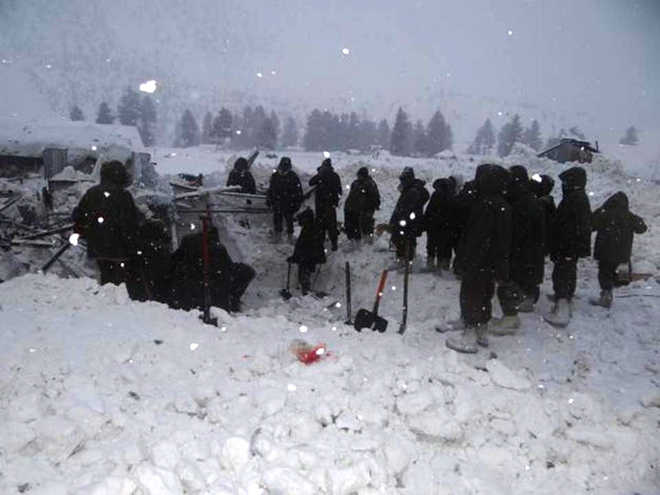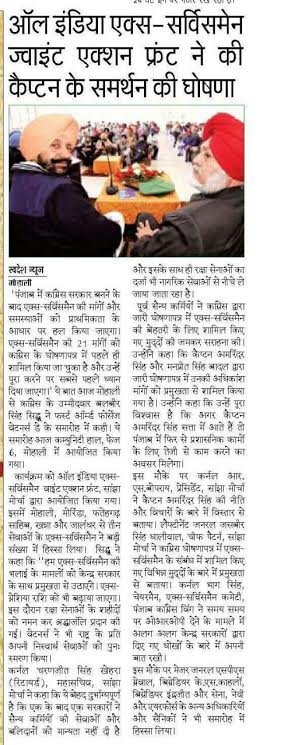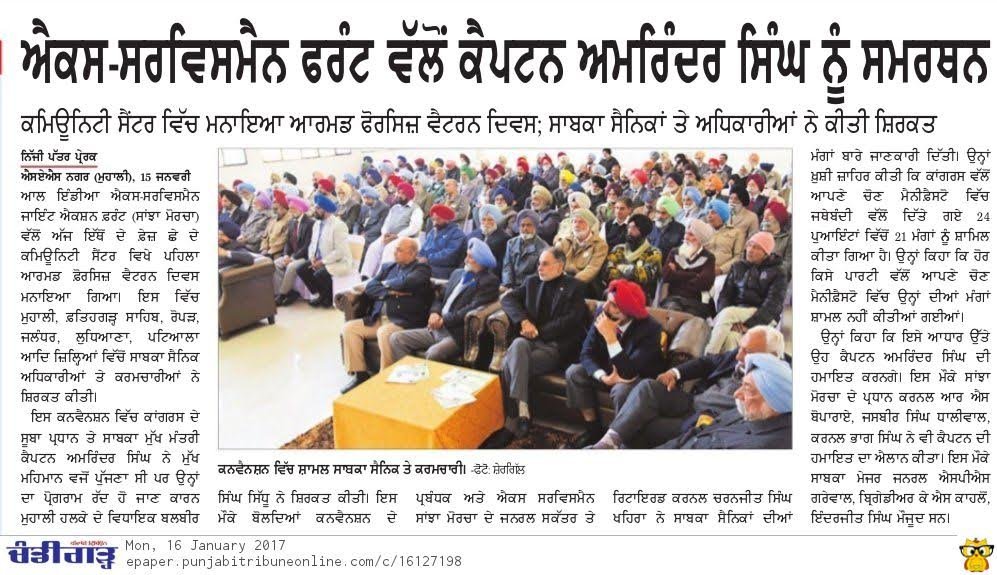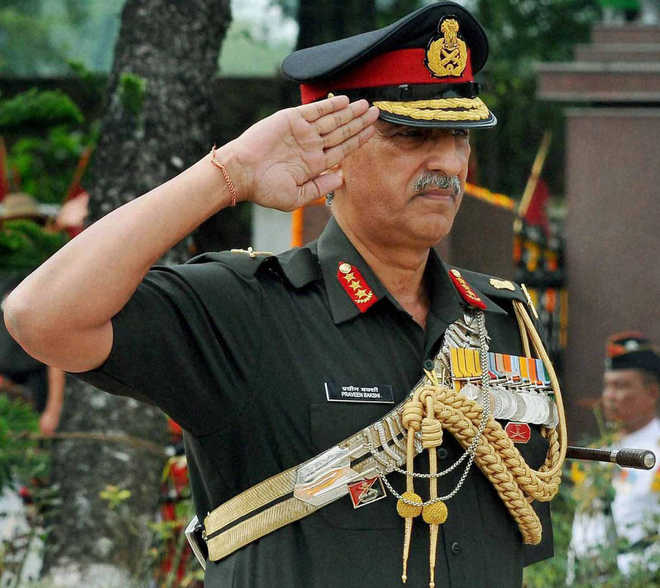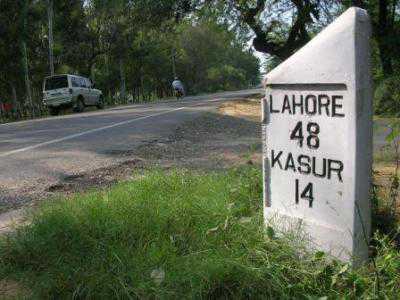
New Delhi, Jan. 5: The majority of ex-servicemen associations have extended support to the Congress ahead of the Assembly elections in five states, giving a fillip to the beleaguered party particularly in Punjab and Uttarakhand that have lakhs of families with serving and retired soldiers.
Today, the Indian Ex-Servicemen Movement (IESM) announced its support to the Congress, days after the Indian Ex-Servicemen League, a 4-lakh strong organisation recognized by an act of Parliament, and the Sanjha Morcha of Punjab did so. Ex-servicemen had supported the BJP in the 2014 Lok Sabha elections.
The IESM, led by Maj. Gen. (retired) Satbir Singh, addressed a joint news conference with Congress leaders Amarinder Singh, the Punjab unit chief of the party, and the chief ministers of Himachal Pradesh and Uttarakhand, Virbhadra Singh and Harish Rawat, at the party headquarters in New Delhi and vowed to “expose” Prime Minister Narendra Modi’s “betrayal” and his government’s “insensitivity” towards soldiers.
The IESM has 25,802 full-time members and is the most influential among such outfits. Though not a union of soldiers or officers, the IESM is an umbrella organisation that coordinates with various soldiers’ outfits.
Criticising the Prime Minister for not fulfilling his commitments on the one-rank, one-pension(Orop) scheme, Satbir Singh said: “We have been protesting at Jantar Mantar for 571 days and nobody from the government has come to talk to us. The government’s approach is shameful; it has humiliated soldiers, who sacrifice their lives for the country. We thought making an intervention in the elections is an option before us. We will educate people on the betrayal by the Modi government.”
While ex-servicemen play a significant role in Punjab and Uttarakhand, their belligerent posturing has the potential of affecting the BJP’s pet plank of robust nationalism built on the heroics of soldiers, including the chest-thumping over the “surgical strike” in Pakistan-occupied Kashmir.
Amid chants of “shame, shame” by his colleagues, Satbir Singh said: “There is an old saying – ‘when a soldier has to go begging for his rights before the king, the king loses the moral right to rule’. Decorated soldiers are sitting on the road for 571 days, we knocked at every door, nobody listened.”
“Defence minister Manohar Parrikar once asked me: ‘Are you sitting there for money?’ I told him if a soldier is concerned about money, his body will not come back wrapped in the Tricolour. We live and die for the country, for dignity and honour. This government has gone back on its words, diluted the approved definition of Orop. We will expose them,” he added.
Amarinder Singh, a former Punjab chief minister and ex-serviceman who is fondly called Captain, hit out at the defence minister for his comments on the selection of the chief of army staff. “If Parrikar can’t keep his mouth shut on such matters, it’s time the PM chooses a man fit enough to look after our services, which are the last bastion of stability, secularism, and in whom the country across the board takes pride.”
Amarinder said an “ill-informed” defence minister was dangerous, adding that Parrikar should be aware that the services function according to a rank structure that indicates seniority and is adhered to by custom.
Parrikar said on Tuesday that intelligence inputs had also been considered while taking the decision on the appointment of the army chief.
The government has appointed General Bipin Rawat as army chief superseding two commanders – Eastern Army Commander Lt General Praveen Bakshi and Southern Army Commander Lt General P.M. Hariz. Parrikar has defended the decision, saying it was taken according to laid-down procedure.
Amarinder asked if the comments meant that intelligence inputs had cast aspersions on Generals Bakshi and Hariz. He said both were outstanding army commanders and soldiers of repute, and that “these foolish off-the-cuff remarks were an insult” to them.
The Congress leaders thanked the IESM for its support and promised to fight for soldiers’ demands. Amarinder announced a 21-point agenda for the welfare of defence personnel in Punjab. The agenda will be included in the Congress’s poll manifesto. The chief ministers of Himachal Pradesh and Uttarakhand too promised to adopt the agenda.
The agenda includes the establishment of an ex-servicemen cell, a separate department for ex-servicemen as guardians of governance, correct implementation of Orop, pay parity between the defence forces and Class A civil services and the removal of “anomalies” in the 7th Pay Commission.
पूर्व सैनिकों ने कांग्रेस के समर्थन का ऐलान किया
वन रैंक-वन पेंशन के मुद्दे पर 570 दिन से धरना दे रहे पूर्व सैनिकों के संगठन इंडियन एक्स सर्विसमैन मूवमेंट ने पांच राज्यों के विधानसभा चुनाव में कांग्रेस को समर्थन देने का ऐलान किया है। कांग्रेस ने भी पूर्व सैनिकों को वन रैंक-वन पेंशन की मांग को पूरा कराने के लिए केंद्र पर दबाव बनाने का आश्वासन दिया है।
पंजाब प्रदेश कांग्रेस कमेटी के अध्यक्ष कैप्टन अमरिंदर सिंह ने कहा कि पार्टी घोषणा पत्र में पूर्व सैनिकों के लिए कई योजनाओं का ऐलान करेगी। उत्तराखंड के मुख्यमंत्री हरीश रावत ने भी वादा किया कि सरकार पूर्व सैनिकों के कल्याण के सभी संभव कदम उठाएगी। उन्होंने पूर्व और मौजूदा सैनिकों के कल्याण के लिए समिति का गठन किया है। कोशिश है कि इन सैनिकों के परिवारों की समस्याओं को प्राथमिकता के आधार पर हल हो।
हिमाचल प्रदेश के मुख्यमंत्री वीरभद्र सिंह ने भी पूर्व सैनिकों की मांग का समर्थन किया। एक्स सर्विसमैन मूवमेंट के अध्यक्ष सेवानिवृत मेजर जनरल सतबीर सिंह ने कहा कि कांग्रेस ने वन रैंक-वन पेंशन की लड़ाई में साथ देने का वादा किया है। इसलिए चुनावी राज्य सहित पूरे देश में कांग्रेस का साथ देंगे।
जनरल सतबीर सिंह ने केंद्र पर वादाखिलाफी का आरोप लगाते हुए कहा कि सरकार ने वन रैंक-वन पेंशन की परिभाषा बदली है। पूर्व सैनिक 14 जून 15 से राजधानी के जंतर-मंतर पर धरना दे रहे हैं। पर सरकार की तरफ से कोई पूछने नहीं आया।











